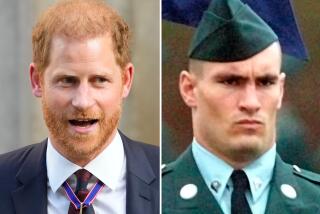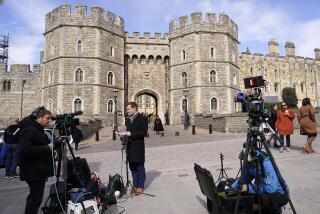For queen and country
AS THE TONY BLAIR era winds down, David Beckham spins out his dotage in sunny Southern California rather than, well, sunny Madrid, and the Beefeaters end a six-century run as a male-only cohort, this might seem a period of iconic eclipse in Britain.
Yet a surprise sunbeam is falling on an institution that a few years ago seemed headed for historyâs dustbin. Welcome back to relevance, House of Windsor.
Prince Williamâs romance with the stately Kate Middleton shows that the royal familyâs tabloid-drawing powers remain undiminished. The queen (or, at any rate, âThe Queenâ) is a likely Oscar contender. Prince Harry has won a measure of regard by deciding to quit smoking and to fulfill his military service in Iraq. Prince Charles, the clanâs eternal fall guy, is the biggest winner: As of this writing, heâs not in the news at all.
Itâs all a big step up from the period in 1997 treated in Stephen Frearsâ film, âThe Queen,â when public outrage over the royal familyâs apparent indifference to Princess Dianaâs sainted memory had Britons calling for an end to the monarchy. The filmâs central question -- what is the duty of a person who occupies an absurd, anachronistic public position? -- is where the royal recovery begins.
This goes beyond the dilemma of whether to abolish the monarchy. Royalty is an error built on the pre-Copernican belief that itâs possible to have a fixed place in the universe. If the titled classesâ portion of the public attention span has diminished over time (and will continue to do so), itâs because the royals are trying to perform a trick that is literally impossible: convincing the public that their peculiar form of celebrity holds meanings -- of honor, tradition and patriotism -- that transcend mere famousness.
So itâs ironic and fitting that the mantle of correct royal behavior has fallen on Harry (dubbed the âspareâ by the tabloids; older brother William is the âheirâ). Until now, the younger prince was best known for smoking weed and dressing up as a Nazi; soon he probably will be shipping out to southern Iraq as part of the Household Cavalry.
Nearly every British war features a version of this drama, in which cautious elders try to dissuade a young noble from putting himself in harmâs way but the young noble insists on serving his country without special treatment or advantage. This supposedly private drama of stoic courage inevitably receives extensive press coverage, and Harryâs case is no exception. But, in the end, itâs hard to gainsay the physical courage required to deploy to Iraq at all.
More to Read
Only good movies
Get the Indie Focus newsletter, Mark Olsen's weekly guide to the world of cinema.
You may occasionally receive promotional content from the Los Angeles Times.










